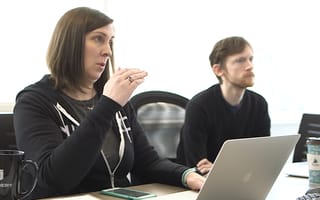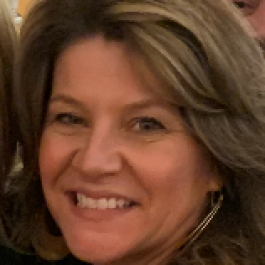
The number of women working in the male-dominated tech industry has remained abysmal over the years, according to Statista. At big tech companies like Microsoft and Amazon, female workers only make up between 28 and 42 percent of the total workforce.
Unsurprisingly, being in the minority in the workplace or on a team makes women more prone to discrimination and self-doubt. Built In Chicago checked in with eight local women tech leaders to learn how they’ve fought these obstacles and how other women can do the same.
Milu Sanderson, engineering director at Duck Creek Technologies, said she took the approach of embracing the struggle of being the lone woman on tech teams.
“It just means that you are challenging yourself and stepping outside of your comfort zone,” Sanderson said.
Meanwhile, Marie Nelson, first vice president of IT business management at OCC, learned early on that she needed to distinguish herself.
“I’ve carried this mindset forward throughout my career and continue to seek opportunities that allow me to reinvent myself in ways where I can deliver value,” Nelson said.
But no matter how these women leaders tackle the challenges of being the only women on their teams, all want to ensure a better future in tech for other women.
“I have learned the importance of fostering confidence in other women and, so they can so they can succeed and ultimately influence the make-up of subsequent teams,” said Meghan Stiling, enterprise architect at Nerdery.
As these women’s experiences suggest, a combination of perseverance and support from other women helps silence the both internal and external doubts and allows them to fearlessly pursue their passions.
Wolverine Trading operates a portfolio of companies specializing in prop trading, asset management, order execution services and tech solutions. The company’s prop trading group is primarily engaged in market making and valuation arbitrage across global markets.
Software Engineer Simona Krifman told us how she gained the confidence to speak up among her male peers, and also shared steps women can take to reduce bias in the workplace.
What is the greatest challenge you've experienced being the only woman on a team, and how did you overcome it?
When I first started my job, being the only woman on my team was detrimental to my confidence. I felt nervous speaking up, especially in a meeting of all men. I was convinced that I would ask a stupid question or that my suggestions wouldn’t make much sense. I also worried that because I was a woman I would be over-scrutinized. During a yearly review with my manager, he mentioned that I should speak up more because he thought I had good ideas. He had no idea that I had been struggling and unwittingly told me exactly what I needed to hear to boost my confidence. I started voicing my opinions more frequently and received positive reactions. The more I spoke up, the more clearly I saw that people valued my perspectives.
What's the most important lesson you learned from being the only woman on a team, and how have you continued to apply that lesson in your professional and/or personal life?
Just because someone is older, more experienced and a man doesn’t mean they’re better at this job than you are. There are so many other skills that you bring to the team outside of pure tech knowledge. Women have greater empathy, show more attention to detail, mentor others more effectively and have more organizational awareness. While these skills are never highlighted in school, they create better leaders and teammates. By focusing more on these characteristics, I’ve been able to grow in the workplace by mentoring interns and leading projects.
What is the best piece of advice you'd offer to other women working on male-dominated teams?
Although it shouldn’t be our responsibility to recruit more women, the task often falls to us. Understandably, not everyone has time to organize a women’s group at work or plan events highlighting women. But if you do have the time, think about doing just that. At Wolverine, we have the Women of Wolverine group.. We have events ranging from book clubs to happy hours to crafting events to help women come together and share experiences.
I also helped start the hiring committee in an effort to reduce biases in the recruitment process across the board. The committee is a mix of men and women, but we share a common cause of hiring a more diverse group of incoming engineers. You might be the only woman in the room for now, but that doesn’t have to last forever.
OCC aims to “ensure confidence in the financial markets and the broader economy.” The derivatives clearing organization offers risk management, clearing and settlement services for a variety of financial products such as standard options, stock loans and futures contracts.
First Vice President of IT Business Management Marie Nelson shared how she fought her way to the top of a male-dominated firm and discussed the importance of building relationships, regardless of gender.
What is the greatest challenge you've experienced being the only woman on a team, and how did you overcome it?
At the start of my professional career, there was a shortage of engineers to meet business demand, so consulting firms in Chicago were hiring candidates who demonstrated the potential to become strong technologists, regardless of their degree. So there I was: a recent college graduate with a finance degree.
While I was grateful that firms recognized my potential, my roles were a bit lackluster. My male counterparts were given positions supporting critical technical roles like development managers and architects, where they could safely develop their technical skills. I was given less technical roles that felt more administrative and tactical. I was happy to support the client any way I could, yet I felt discouraged.
One day, I realized there was an entire business requirements library at my disposal (back when they were printed binders of signed requirements) and recognized this as an opportunity to distinguish myself from my peers. While my male counterparts honed their technical skills, I deepened my knowledge of the business. I was quickly recognized for my business acumen, leading to opportunities to present at conferences and work on large-scale proposals with our sales and business development teams. I learned early on that I needed to distinguish myself from my peers. I’ve carried this mindset forward throughout my career and continue to seek opportunities that allow me to reinvent myself in ways where I can deliver value to the firm.
What's the most important lesson you learned from being the only woman on a team, and how have you continued to apply that lesson in your professional and/or personal life?
As women, we have different experiences than our male peers. When faced with a challenge, whether that is work, community or family, appreciating all perspectives is paramount. We need to find our voices and share our knowledge and opinions. More than ever, businesses are realizing that diversity of thought fosters creativity, innovation and inclusive and holistic solutions. With this in mind, women have more opportunities today to influence and shape the future.
This is no different at home with three boys and a husband where I’m the only female voice. It’s been important to create an environment where my boys can observe the interactions between two parents who respect each other and have equal voices in all decisions. It is my sincere hope that I am raising young men who seek and appreciate the perspectives and opinions of others.
What is the best piece of advice you'd offer to other women working on male-dominated teams?
Invest time in building relationships at all levels, regardless of gender. Understand others’ perspectives, and be sure to share yours. Deepening your relationships fosters trust and collaboration so you can make change happen. It’s also critical to find your sponsors who are different from your mentors. Sponsors are executives within the business who will advocate for your growth and internal advancement as new opportunities arise, while mentors are often external colleagues who can help you identify strengths, talk through challenges and offer advice throughout your career. Of course, these roles sometimes blend, but the value of these people in your life should never be overlooked.
TransUnion wants to make transactions between businesses and consumers safer and more reliable. The company helps organizations better understand consumers, so they can make more informed decisions and deliver engaging, personalized experiences.
Vice President of Information Security Marcia Peters shared how strong communication can help women connect with male coworkers — and earn their respect.
What is the greatest challenge you've experienced being the only woman on a team, and how did you overcome it?
At one time in my career, I was the only woman on a particular team — and also happened to be the manager. Gaining respect was a challenge. The team was polite but saw me as an outsider. I found success by asking for their help (respecting them in their areas of expertise), supporting them with leadership and caring about them as people. When I left that company, I received an email from one of the team members acknowledging my efforts. This was the validation and acceptance I had hoped for. Leading this team was such a great learning moment in my career, and it still remain one of my favorite teams to this day.
What's the most important lesson you learned from being the only woman on a team, and how have you continued to apply that lesson in your professional and/or personal life?
Communication is a great place to focus. I’ve experienced situations where team members would come to me, and I didn’t always know how to respond, which led to them sometimes feeling unheard. I found the best way to mitigate that is to talk about expectations and communication styles. We found success by prefacing conversations with a lead-in to the content. I continue to use this approach today when sharing information with senior leadership and even with my family.
What is the best piece of advice you'd offer to other women working on male-dominated teams?
You don’t have to be one of the guys, but you have to be a part of the team. Find ways to connect by concentrating on similar interests. Do you like the same movies, or do you both enjoy travel, Python, Terraform or building computers from pieces in your basement? Show up for the team. If someone is working on the weekend, meet them in the virtual office to ensure they don’t feel alone.
Duck Creek Technologies is on a mission to “revolutionize insurance for the greater good.” The company offers core system solutions through its enterprise SaaS solution, Duck Creek On Demand.
Engineering Director Milu Sanderson discussed how it’s important for women to step outside of their comfort zone and embrace their personal strengths.
What is the greatest challenge you've experienced being the only woman on a team, and how did you overcome it?
The tech industry has come a long way. Though it is still a male-dominated industry, it has been a long time since I have found myself the sole female on a team. I would say that one of the challenges early on was finding a way to be impactful when my management style didn’t fit neatly into a more male-dominated operation. I spent time trying to morph into an already established culture before I realized that it was a hindrance. Progress really came once I started playing to my strengths and what I could bring to the table.
What's the most important lesson you learned from being the only woman on a team, and how have you continued to apply that lesson in your professional and/or personal life?
One thing that has become clear to me is that everyone has moments of questioning whether or not they are qualified to be in a particular situation (in a leadership role, part of a team, or making an important decision). That is not a gender-specific experience; it just means that you are challenging yourself and stepping outside of your comfort zone, and that is exactly what you should be doing. In order to be open to growth, you must put yourself in situations where you are not the expert. I have learned to take advantage of those situations and use them to learn something new and find valuable ways to contribute.
What is the best piece of advice you'd offer to other women working on male-dominated teams?
Be confident; you are at the table for a reason. Play to your strengths, and do not worry about whether your skill sets mirror a stereotype. The best ideas, innovation and successful products are developed through diverse and well-balanced teams. The fact that you may approach a problem differently than a male counterpart or bring different experiences and points of view to the table is a good thing. That is when innovation occurs, and it is exactly what the tech industry needs as we move forward.
Shiftgig seeks to “transform the way people work” with its on-demand staffing software. Companies can use their app to place orders and request help, enabling workers to browse and claim suitable shifts and create a personalized, flexible schedule.
Chief Technology Officer Thulasi Kethini discussed how it’s important for women to share their unique strengths and find a good manager, even if that requires searching for a new job elsewhere.
What is the greatest challenge you've experienced being the only woman on a team, and how did you overcome it?
Being the only woman means that sometimes, folks have a hard time seeing you as a leader. This unconscious attitude often came from my peers. Building trusted relationships early on with my peer group was critical to my ability to influence and get things done. I also became the source of diversity. During some meetings, I would include members who bring in a different point of view and a new voice. Sometimes, people find it difficult to adjust to a new point of view, so that change in mindset takes time and practice.
What's the most important lesson you learned from being the only woman on a team, and how have you continued to apply that lesson in your professional and/or personal life?
Most of the time, it’s possible to turn a seemingly disadvantageous situation into the opposite. When you are the only woman on the team, remember that you stand out. Everyone remembers your name. If you do a good job on a project, people will not forget you.
Double down on your strengths. Identify your strengths that are especially scarce and valuable to your environment, and don’t be shy about displaying them. This applies to both technical and soft skills. You will be far more productive and happier by focusing on strengths. It also makes you invaluable to the team.
What is the best piece of advice you'd offer to other women working on male-dominated teams?
Make sure you have a good manager that you can trust and learn from. If you don’t, then find a new job. While this may seem easier said than done, it’s far easier in the technology industry than in most other fields, so take advantage of that. Having a good manager who can treat you fairly and mentor you is especially critical during the earlier years of your career. Lastly, have fun and stay positive. It’s contagious.
Nerdery is a consultancy that seeks to help organizations thrive in the digital world. With a focus on strategy, design and technology, the company offers a broad range of services including digital business transformation, customer experience strategy and data engineering.
Enterprise Architect Meghan Stiling discussed why women should acknowledge gender disparity in the workplace and how they can inspire confidence in each other.
What is the greatest challenge you've experienced being the only woman on a team, and how did you overcome it?
One of the greatest challenges of being the only woman on a team is seeing the situation as empowering rather than discouraging. I focus on making an impact and looking for opportunities to share my experience to prepare other women to succeed in similar roles.
What's the most important lesson you learned from being the only woman on a team, and how have you continued to apply that lesson in your professional and/or personal life?
I have learned from frequently being the only woman on a team the importance of acknowledging the situation, while not letting it intimidate me or hold me back. Teams lacking gender parity are ubiquitous in my industry. I have learned the importance of fostering confidence in other women and, so they can so they can succeed and ultimately influence the makeup of subsequent teams.
What is the best piece of advice you'd offer to other women working on male-dominated teams?
Actively work to build a strong network of women that you respect. Seek out opportunities to advocate for them to take on new opportunities. Remember that progress is incremental and not always linear, and try to not be discouraged that there is still a long way to go. You should be proud of your accomplishments and skills while looking for opportunities to foster that confidence in an expanded group of women.
Nielsen Global Connect is dedicated to helping manufacturers and retailers grow their businesses. The company offers data, solutions and insights to help organizations better understand consumers and more easily navigate the marketplace.
Tech Lead Diane Waters told us how she overcame “subtle bias” in the workplace and discussed why women should foster learning and collaboration among their peers.
What is the greatest challenge you've experienced being the only woman on a team, and how did you overcome it?
The greatest challenge I encountered after joining an existing all-male development team was dealing with subtle bias from team members. Early on, I felt very excluded. To overcome this, I learned as quickly as possible so that I was able to add value to the team. Real contributions to the team speak volumes. When I was met with unconscious bias, I addressed it and used it as a teachable moment. Because of this, I’ve seen my team’s growth and ability to collaborate improve.
What's the most important lesson you learned from being the only woman on a team, and how have you continued to apply that lesson in your professional and/or personal life?
An important lesson is to maintain a collaborative mindset and attitude, regardless of your gender. High-performing teams consist of highly collaborative individuals. Encourage and foster an environment where all team members are comfortable asking questions and sharing their ideas, eager to listen, excited about learning and mentoring others. Working on these types of teams has been rewarding and enjoyable.




















.jpg)
